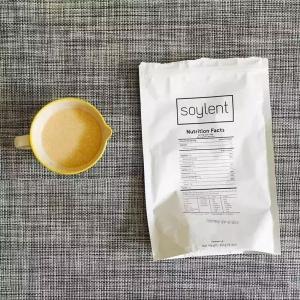A startup called Soylent wants to change the way people consume calories.
成立不久的Soylent綠色食品生產(chǎn)公司想要改變?nèi)藗兿目防锏姆绞健?/div>
“One should eat to live, not live to eat,” wrote Moliere, the French comedic playwright.
法國(guó)喜劇作家莫里哀曾寫過(guò)“人應(yīng)為生而食,不應(yīng)為食而生”。
Some workaholic entrepreneurs have taken him at his word.
一些企業(yè)家工作狂都已信奉他這句話。

Soylent, a two-year-old startup, is trying to save consumers time and money by selling them a healthy, cheap “meal” that they can drink.
Soylent是一家成立了兩年的小公司,它向消費(fèi)者銷售健康便宜并且能喝下去的“飯”,以此來(lái)節(jié)省消費(fèi)者的時(shí)間和金錢。
Each vegetarian portion has only around 400 calories, costs around $3 and boasts of being as nutritious as, and more environmentally-friendly than, processed food and meat.
每種素食成分的熱量大概只有400卡路里,售價(jià)3美元左右,和加工過(guò)的食品和肉類一樣富含營(yíng)養(yǎng)而且更加環(huán)保。
Soylent has found a place among American workaholics who resent the cost and hassle of preparing regular meals.
Soylent在那些因費(fèi)錢費(fèi)力而不喜歡準(zhǔn)備正餐的美國(guó)工作狂中找到了銷路。
This is especially true in Silicon Valley, home of many “early-adopter” engineers too consumed with coding the future to break from work.
這在“早期接受者”工程師之家的硅谷更是如此。工程師們過(guò)度忙于給未來(lái)編碼而沒(méi)有時(shí)間休息。
Their bad diets can damage their health.
不健康的飲食會(huì)毀壞他們的健康。
Several years ago Sam Altman, an entrepreneur who is now president of Y Combinator, a startup boot camp, was so cost-conscious and focused on building his first company, Loopt, that for weeks he ate only ramen noodles and coffee ice cream, until he developed scurvy.
時(shí)任Y聯(lián)合者(Y Combinator,成立不久的創(chuàng)業(yè)孵化營(yíng)公司)總裁的企業(yè)家山姆·阿爾特曼幾年前專注于成立自己的第一家公司Loopt,他非常有成本節(jié)約意識(shí),以至于連續(xù)幾周只吃拉面和咖啡冰淇淋,直到他得了壞血病。
He later became an investor in Soylent.
后來(lái),他成為了Soylent的投資人。
At first the product was sold as a powder, but even that was a hassle for some consumers, so on September 9th it started shipping version 2.0, which comes already mixed and bottled.
起初,Soylent的產(chǎn)品是以粉末狀銷售的,但即便這樣,對(duì)一些消費(fèi)者來(lái)說(shuō)還是很麻煩,因此在9月9日,它的銷售版本升級(jí)為Soylent 2.0,該版本的產(chǎn)品為開蓋就能直接喝的瓶裝飲料。
The name Soylent is a tribute to a 1966 science-fiction novel, “Make Room! Make Room!”, set in an overpopulated world where everyone eats a mixture of lentils and soy (and, in the film version, human flesh) .
Soylent這個(gè)名字來(lái)自于1966年一部科幻小說(shuō)“Make Room!Make Room!”,小說(shuō)故事設(shè)置在人口過(guò)剩導(dǎo)致資源匱乏的未來(lái)世界,在那里所有人都吃由扁豆和大豆制成的Soylent餅片(在電影版本中,他們還吃人肉)。
Rob Rhinehart, the drink's 27-year-old creator, came up with the idea when he was working on a different startup, focused on wireless internet.
流體食品開創(chuàng)者羅布·萊因哈特,今年27歲。他在一家研究無(wú)線網(wǎng)絡(luò)的小公司上班時(shí)想到了一個(gè)主意。
He was so poor that he started mixing his own food, and later dropped the other project to focus on food technology.
他太窮了以至于開始把自己的食物都混合著吃,后來(lái)他丟下另一個(gè)項(xiàng)目跑去研究食品科技。
He is, by any measure, extreme.
不管以何種標(biāo)準(zhǔn)來(lái)衡量,他都太窮了。
He considers shopping at grocery stores, in the presence of “rotting” produce, a “multisensory living nightmare”, and no longer owns a fridge.
站在一堆“腐爛”的農(nóng)產(chǎn)品面前,讓他覺(jué)得在雜貨商店購(gòu)物就像在做一場(chǎng)糾結(jié)的,活生生的惡夢(mèng),因此他再也不使用冰箱了。
Soylent has proved that it can appeal to a niche, as well as to a handful of financiers: in January the firm raised $20m from investors, including Andreessen Horowitz, a well-regarded venture-capital firm.
Soylent證明了它能吸引利基市場(chǎng)和一部分的金融家:一月份,它從投資者中籌集到了2000萬(wàn)美元,它的投資者包括安德森·霍洛維茨基金,一家有名望的風(fēng)險(xiǎn)投資公司。
But it has plenty of obstacles to overcome.
但它需要克服很多障礙。
Yucky-sounding ingredients like algal oil (yes, derived from algae) will put many off, as well as reviews from early users that Soylent makes them gassy.
聽起來(lái)很惡心的原料,比如海藻油(的確從海藻中提取出來(lái))以及早期用戶評(píng)論Soylent的產(chǎn)品讓他們吃了有口氣,這些讓很多顧客望而止步。
“I prefer my food with both flavour and texture,” says one young, vegetarian entrepreneur who has tried it.
一位嘗試過(guò)Soylent產(chǎn)品的年輕素食企業(yè)家說(shuō)“我喜歡我的食物有香味和質(zhì)感” 。
Mr Rhinehart insists that Soylent's “neutral” taste is the best way to appeal to the broadest group of people.
萊因哈特先生堅(jiān)持認(rèn)為Soylent那種“中性化”的味道是用來(lái)吸引最廣泛人群的最好方式。
Just how big that group really is, however, remains to be seen.
然而這個(gè)群體真正有多大還有待分曉。



